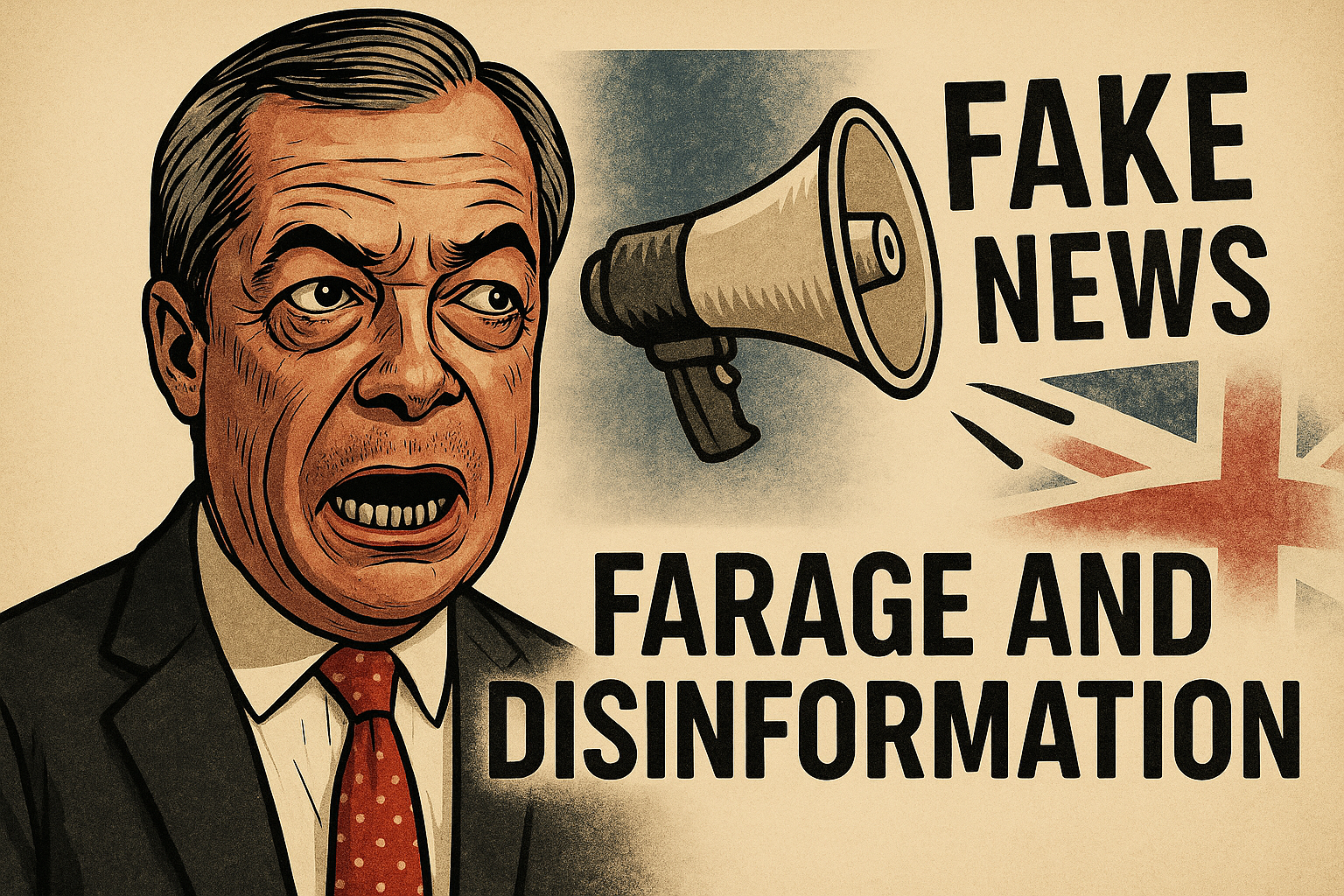
Nigel Farage and Disinformation
Part of the Farage in the Media hub.
Overview
Nigel Farage’s political influence has been amplified by the strategic use of misleading claims and selective framing across media platforms.
From the 2016 Brexit campaign to his current GB News role, Farage has repeatedly promoted narratives later proven inaccurate or exaggerated.
This page examines the patterns, evidence, and impact of disinformation within Farage’s public messaging.
Early Use of Disinformation – The Brexit Campaign
- The most infamous example was the £350 million-a-week for the NHS claim, displayed on the Brexit campaign bus and repeated by Farage.
- The figure was widely debunked by the UK Statistics Authority and Full Fact.
- Despite public correction, Farage continued referencing it years later — an early indicator of his repeat-and-reframe tactic.
👉 Verdict: False / Proven inaccurate by official sources.
Post-Brexit Narratives
- Following the referendum, Farage asserted that “Brexit has been betrayed” and that Britain’s economic problems stem solely from EU obstruction.
- Data from the Office for Budget Responsibility (OBR) and Institute for Fiscal Studies (IFS) contradict these claims, showing trade and growth losses tied to Brexit policy choices.
- Repetition of unverified grievances keeps his political brand active even without office.
👉 Verdict: Misleading / Selective interpretation of data.
Disinformation via Broadcast Platforms
- On GB News, Farage has echoed unverified theories such as “climate lockdowns” and “mass voter fraud.”
- Fact-checking by Full Fact, Reuters, and Politico Europe found no credible evidence supporting these claims.
- Ofcom has investigated several GB News programmes featuring Farage for breaches of accuracy standards.
👉 Verdict: False / Unsupported by evidence.
Social Media Amplification
- Farage’s content spreads widely on X (formerly Twitter), Facebook, and TikTok, where clips are reframed with sensational captions.
- Research from Cardiff University and the Reuters Institute shows that repetition of emotionally charged misinformation significantly boosts engagement.
- Disinformation functions as a digital marketing tool, blurring the line between news and outrage.
👉 Verdict: True / Supported by media-research evidence.
Public Impact and Responsibility
- Surveys by YouGov reveal that many Britons still believe debunked Brexit claims.
- Communication experts argue that Farage’s approach normalises factual distortion as legitimate debate.
- The Online Safety Act 2023 and Ofcom’s new oversight rules aim to curb misinformation, though enforcement remains limited.
👉 Verdict: True / Public awareness confirmed by data.
Conclusion
Disinformation is central to Farage’s communication strategy.
By repeating partial truths and framing corrections as censorship, he maintains a loyal audience and continuous visibility.
The long-term result is erosion of trust in journalism, government, and democratic institutions.
👉 Overall Verdict: False – Farage’s record shows a consistent pattern of verifiable misinformation.
Sources
- Full Fact – Fact-checks on Farage and Brexit claims
- UK Statistics Authority – Assessment of NHS £350 million claim
- Office for Budget Responsibility – Post-Brexit economic forecasts
- Institute for Fiscal Studies – Brexit impact reports
- Reuters – Fact-checking Farage broadcast claims
- Politico Europe – Farage and GB News fact-checks
- YouGov – Public belief in Brexit and misinformation data
- Reuters Institute – Digital News Report on misinformation
Navigation
👉 Back to the Farage in the Media hub
👉 Explore the Controversies index
Disclaimer
Farage Exposed is an independent, non-commercial project created for public information and educational purposes. All content is based on publicly available, verified sources. Readers are encouraged to critically assess all information. No endorsement or affiliation is implied.
